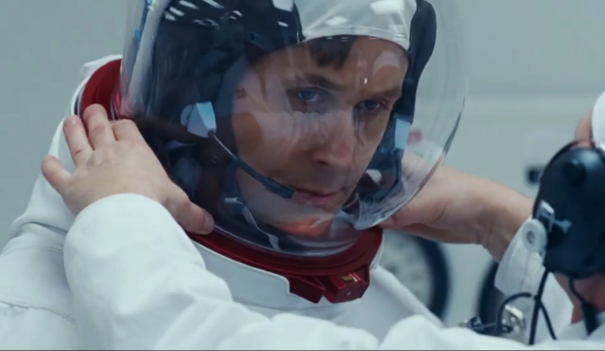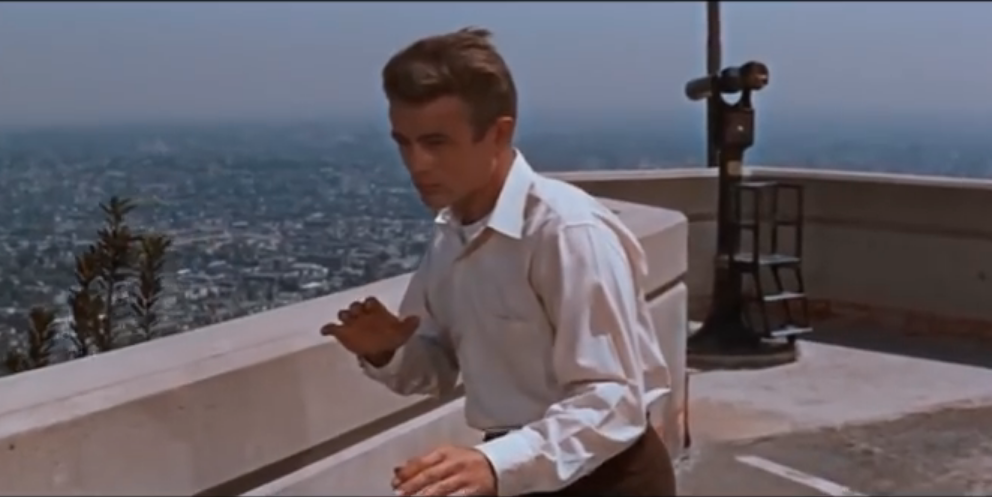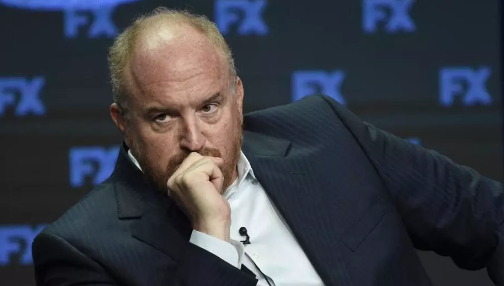On the 15 north toward Barstow, and internet connectivity is spotty. I’ve nonetheless managed to watch this Other Side of the Wind trailer twice, and I’m thinking that the choppy, whiplash editing might prove a bit taxing if the whole film is like this. I shouldn’t say anything more — it’s just a trailer. I’m told that I should watch Morgan Neville‘s Orson Welles doc, They’ll Love Me When I’m Dead, before watching the main feature. Netflix streaming for press, etc.
“Saving Private Ryan” of NASA Space Epics?
From Owen Gleiberman’s Variety review of Damian Chazelle‘s First Man: “The fact that space travel, viewed from the inside, could look and feel so much more abrasive and hazardous than we might ever have thought is part of the raw dramatic power of First Man. The movie captures that death was always part of it. The steep risk factor, the sheer number of pilots and astronauts who lost their lives, the scary macabre thrust of the voyages — it was all a dream poised on the edge of an abyss.
“First Man bears the same relation to the space dramas that have come before it that Saving Private Ryan did to previous war films. The movie redefines what space travel is — the way it lives inside our imagination — by capturing, for the first time, what the stakes really were.”
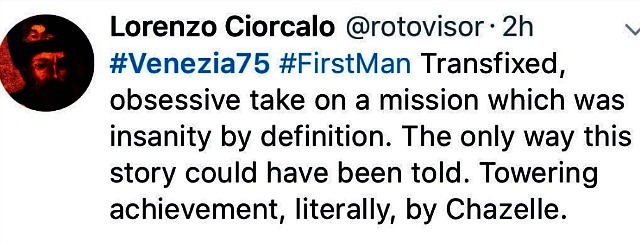
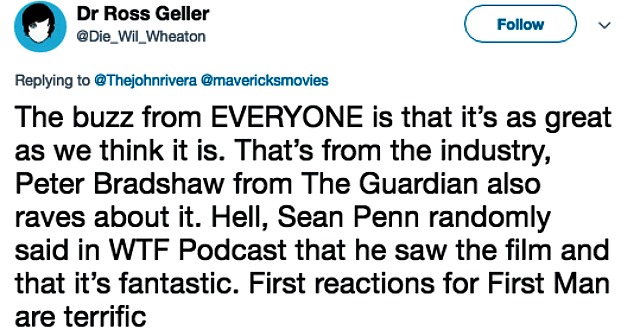
The Hollywood Reporter‘s David Rooney says that “this sober, contemplative picture has emotional involvement, visceral tension, and yes, even suspense, in addition to stunning technical craft.
“The extent to which mainstream audiences will respond to the lengthy film’s unfaltering restraint remains to be seen” — in other words, portions of the popcorn crowd may feel unfulfilled in terms of standard jingoistic rah-rah vibes. “But this is a strikingly intelligent treatment of a defining moment for America that broadens the tonal range of Chazelle, clearly a versatile talent, after Whiplash and La La Land.”
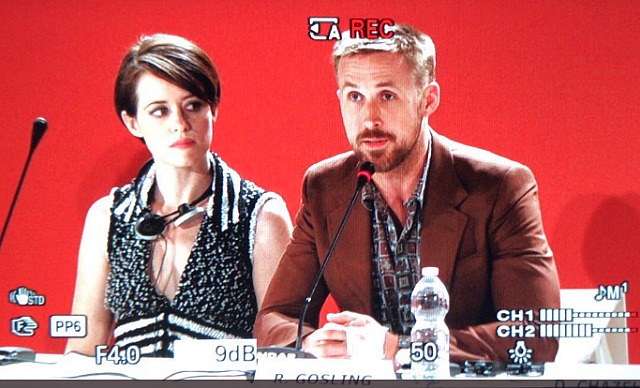
Nobody has a history of generating shock waves across the men’s fashion universe like Ryan Gosling. A brown suit with almost ’70s-style wide lapels? Along with a complex-pattern print shirt that may have been bought from a roadside seller in Tijuana?
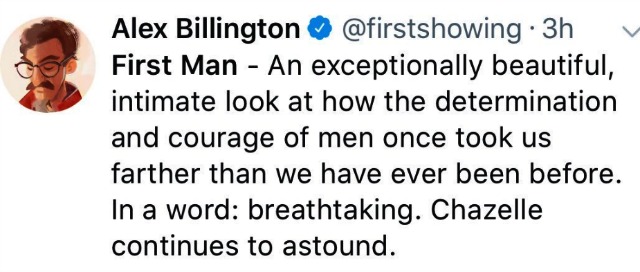
Beware of any Alex Billington rave of any FX-rich, eyeball-filling movie — he’s Mr. Easy in this regard.
Wheels Across America
Variety music reporter and AARP magazine film critic Chris Willman picks me up tomorrow morning around 6:30 am, give or take, and then it’s off to Gallup, New Mexico. Typing is always difficult in a moving car, but I can manage. 11:30 pm now — alarm set for 5 am. Expecting to hit Telluride around 2 or 3 pm on Thursday afternoon. Awards Daily‘s Sasha Stone is driving also, but she tends to poke along. Last year she arrived Thursday evening.

Red Flags
A Venice-Telluride-Toronto assessment by WorldofReel’s Jordan Ruimy: “Telluride no-shows that are premiering at Venice include Suspiria, The Sisters Brothers, Sunset, Maya, Kursk, 22 July, Buster Scruggs, The Nightingale and A Star is Born.
“Meanwhile, Toronto can brag about snatching up world premieres for Widows, If Beale Street Could Talk, High Life, Beautiful Boy, The Death and Life of John F. Donovan, The Outlaw King, Hold the Dark, Mid90s, Fahrenheit 11/9, Ben Is Back, Green Book, The Land of Steady Habits and many more.
“Can we now conclude that this year’s Cannes Film Festival had a fantastic lineup? Part of the complaints that derived from this year’s pre-Cannes buzz was the fact that the festival failed to deliver the big names.
“However, looking at all the Cannes rejects and now the mixed buzz surrounding them, maybe Cannes topper Thierry Fremaux was right all along in not including Peterloo, Loro, The Death of John F. Donovan, The Sisters Brothers, Suspiria, The Nightingale, Sunset, Maya, Kursk and a few others. These rejections, and consequent pickups by Venice, could definitely detract from the quality of the films being presented at the Lido this year.
“Now There’s No Sticking, Just a Little Jabbing”
Late yesterday afternoon Tatyana and I did a Griffith Park Observatory hike. We started by sneaking through a security gate and strolling past Angelina Jolie’s stately manse, which was known for decades as the one that Cecil B. DeMille once lived in. Then we humped it up Catalina Drive and onto the hill trails that lead to the observatory. I hadn’t visited this historic location for 26 or 27 years. To me it’s not a scenic tourist spot as much as holy James Dean ground — i.e., where the knife fight happened in Rebel Without A Cause. Remember that I own a deep-red James Dean jacket.


The former Cecil B. DeMille mansion, now known as the place where Angie and the kids live.

Take Off 20 Years
Ben Kingsley, 74, has obviously been digitally de-aged for his performance as SS Holocaust organizer Adolf Eichmann in Chris Weitz‘s Operation Finale (MGM, 8.29). Update: Saw it tonight…not bad, decent, alternates between good and perfunctory. Kingsley’s digital de-aging is minimal — no comparison with the extensive de-aging that Robert De Niro and Al Pacino are undergoing for Martin Scorsese‘s The Irishman.
Has Louis C.K. Waited Long Enough?
It was reported yesterday that Louis C.K. came out of hiding Sunday night for 15 minutes. After being outed last November by the N.Y. Times for being a weenie wagger and then confessing to same a few days later, the 51 year old comedian performed a surprise 15-minute set at Manhattan’s The Comedy Cellar.
The message was “okay, I took myself out of circulation nine months ago for good reason, but now that I’ve done some isolation time — call it a meditative prison sentence — I’d like to begin to inch my way back into performing again…is that cool or, you know, what do you think?”
Guys seem willing to cut him a little slack while women are like “what, he’s back already?”
HE’s view is “well, what he did was obviously grotesque, but how many months of living in the shadows does he have to commit to before he’s allowed to start performing again? He didn’t kill, rape or sexually stalk or harass anyone, at least not on a sustained basis. And he didn’t expose himself to children. He copped to being a creep and threw himself on the church steps. He needed to go away, obviously, but what kind of a sentence does he need to serve? A year? Two years?”
Is the general #MeToo position that he deserves (a) a death sentence, (b) a life of wandering in the desert like Charlton Heston in The Ten Commandments, (c) five or ten years of wandering or (d) something less severe?
Comedy Cellar owner Noam Dworman told the Times’ Melena Ryzik that “there can’t be a permanent life sentence on someone who does something wrong.”
What Louis C.K. did with those women who spoke to the N.Y. Times wasn’t just hurtful and offensive — it was astonishing. Before that story ran I’d never even heard of a guy whipping it out as a form of foreplay or whatever. My reaction was “who does that?”
Summer Summary: Shiners, Stinkers & Overrated Thuds
Let’s get something straight right off the bat. Two of the best films of the 2018 summer season were not fucking Avengers: Infinity War or Ant Man and the Wasp…Jesus. The latter was reasonably decent and amusing as far as it went, but it was no Ant Man, and the former was agony to sit through. Plus that ending in which Thanos manages to turn almost everyone into sand and blow them into the wind machine…bullshit. The Marvel franchise has never respected death, and it never will.
HE’s ten best films of the summer (if you define “summer” as May 1st through August 31st): Paul Schrader‘s First Reformed, Bjorn Runge‘s The Wife, Ari Aster‘s Hereditary, Stefano Sollima‘s Sicario — Day of the Soldado, Chris McQuarrie and Tom Cruise‘s Mission : Impossible — Fallout, Eugene Jarecki‘s The King, Jeremiah Zagar‘s We The Animals, Bo Burnham‘s Eighth Grade, Morgan Neville‘s Won’t You Be My Neighbor, and Matt Tyrnauer‘s Scotty and the Secret History of Hollywood.
Spike Lee‘s BlackKklansman is a decent…okay, above-average police caper hoodwink flick with a great, balls-to-the-wall, Trump-blasting finale. The general response was thumbs up enough to suggest that Lee might snag a Best Director nomination, and after 35 years of banging out distinctive, high-style movies and many with something to say, he deserves it.
Boots Riley‘s Sorry To Bother You “is a piece of wildly-out-there satire that warrants everyone’s attention and respect. I laughed from time to time and admired the Brittania Hospital-meets-Idiocracy surrealism, but I just didn’t care for the Oakland prison colony vibe (especially after sitting through the tedious, Oakland-based Blindspotting). As much as I got off on Riley’s edge and flamboyance and inventive sidestepping of the usual-usual, I didn’t want to ‘live’ in this film. And that’s a key thing” — from my 8.2.18 review.
Carlos Lopez Estrada and Daveed Diggs‘ Blindspotting isn’t good enough. It over-emphasizes, underlines, over-explains, assumes the audience needs help. Rafael Casal‘s portrayal of Diggs’ best friend, a violent, hair-trigger, gun-wielding asshole who’s always threatening to start shit about the slightest personal offense or otherwise do something that might attract the attention of the bulls, is intolerable. The 32 year-old playwright relies on a broad caricature of Oakland street blackitude — machismo shit talk, constant strut, a mouthful of gold fillings, flashing pistols, drop-of-a-hat hostility, etc.
It’s my view that while the hugely popular Crazy Rich Asians is occasionally diverting (especially during the first 30 minutes or so), it was nonetheless made by and for synthetic money whores. As I said ten days ago, it’s “a satire of the aggressively shallow values of the highly insecure moneyed classes of southeast Asia, but the satire doesn’t cut very deep because the film shares these values and in fact adores them…each and every shot is about showcasing obscenely flush, over-the-top flamboyance (clothes, homes, interior designs), and by the one-hour mark the spirit weakens and the nausea kicks in.”
What did I miss that’s worth mentioning? Even to put down?
That’s It?
I’m sorry but I’m getting the wrong kind of signals from this barely-there teaser for Brady Corbet‘s Vox Lux, a seemingly angst-ridden music-industry drama that focuses on 18 years in the life of Celeste, a gloomhead pop superstar (Natalie Portman). I don’t mean the kind of signals that suggest a possibly bad or frothy or ineffective film (I read a draft of the script a year or so ago and it wasn’t half bad), but indications that some of us may not give that much of a shit.
Making it in the music business is no small feat, and lasting, much less maintaining relevancy, in the limelight for over 15 years is even tougher, and so I vaguely resent films that suggest superstardom is mainly about having great hair and the right kind of wardrobe and expert lighting design and multitudes screaming your name.
Put another way, I vaguely resent movies about hugely popular performers that fail to convey how difficult it is to be even a competent, half-decent musician-performer (I’m saying this as a formerly mediocre drummer), much less fulfill a phenomenal potential. Geniuses don’t have to sweat the inspiration part, but they still have to work and perspire their asses off to make the song (or the novel or the film or the haute couture line) come out right. Movies always seem to ignore the creative struggle aspect.
Oh, and a Scott Walker score isn’t enough. There has to be a good, solid film to complement his input…sorry.
Corbet’s 110-minute drama, currently without distribution, will premiere soon at the Venice Film Festival. Raffey Cassidy, Jude Law, Stacy Martin and Jennifer Ehle costar.
Word Around Venice Campfire
There are always two or three films that run into critical difficulty at any Venice Film Festival. I’ve already noted that Jennifer Kent‘s The Nightingale may (I say “may”) encounter some degree of pushback. I heard a while back that Damien Chazelle‘s First Man may be principally appreciated for its technical chops. I was told yesterday that a film I won’t name is “a third-rate wannabe Kubrick” that nonetheless “will be highly praised.” It’s been further asserted that Laszlo Nemes‘ Sunset (a Cannes snub) and Florian von Henckel Donnersmark‘s Never Look Away (aka Work Without Author) may encounter mixed responses. Who knows?
The late afternoon sun is beginning to set on the Venice lagoon, the vaporetti are chug-chugging back and forth between the main city and the Lido, and credentialed critics (including Variety‘s Guy Lodge) are unpacking their bags, sharpening their #2 pencils and thinking about where to get dinner. It all begins tomorrow morning at 8:30 am with an early-bird-catches-the-worm press screening of First Man.

This Is Their Solution? Murder Roseanne?
In a Sunday Times interview Roseanne costar John Goodman said that Roseanne Barr’s character will be “killed off” in the upcoming spinoff series, to be called The Conners. Goodman said that his character, Dan, will “be mopey and sad because his wife’s dead.”
Does this strike anyone as a clever, catchy way to dispose of Roseanne’s character? Kill her like some Cuban assassin in a Scarface remake? Or what…give her cancer or something?
HE solution: Roseanne has left Dan for a Russian mobster, whom she met during a visit to see relatives in Chicago. The Russian boyfriend didn’t propose marriage but insisted that Roseanne divorce Dan so she’d be free to move with him to Moscow. The Russian guy is super-rich, but it’s not all hearts and flowers because he’s into whips, chains, bondage and discipline, which Roseanne has a problem with. But in for a penny, in for a pound.


